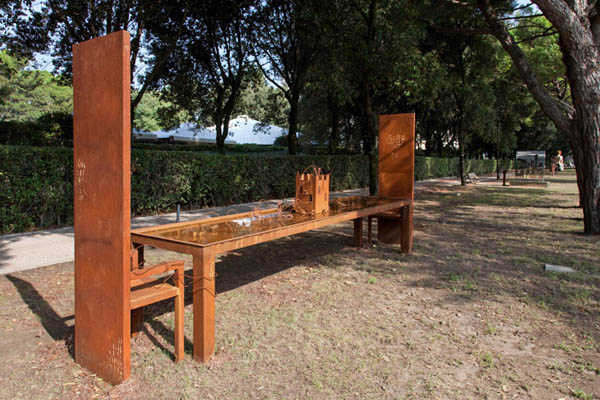Italy
Enrico Benetta
Irony is a complex, elusive yet abrasive thing, like a caress followed by a slap in the face. Its characteristic is the attraction of lightness, of the ear-to-ear smile which lights up one's face. But then, the disarmed interlocutor must face heaviness and depths, sometimes painful, which were and continue to be beyond suspicion. These are themes which strike deeply and agitate the mind without making it change direction. Enrico Benetta is a mature artist who uses irony as material for his art, together with iron, water and painting. Indeed, it is impossible not to smile at his proposals, not to be surprised that the first game which he places on the scene, whether this be something disproportionate, a citation, a fantastic fairy tale of surreal objects, does not stop at that seduction but immediately afterward introduces certain considerations which are always substantial. Enrico Benetta is a three-dimensional bard who cannot do without space in which to gather his emotions and the writing which, like the words, is the means of telling the tale. Joy and poetry are the two traces from which he never separates himself. With these, he has fun in creating genuine scenes made of calligraphy and objects, always disproportionate, which seem to come from a new Wonderland, Alice and all, or suggested by a keen, fable-like tale as Italo Calvino wrote. But for every scene there is a corresponding moral, an experience, a lesson and a piece of advice from one who knows how to enjoy the happiness and richness of life, but also sees the difficulties. More recently, every now and then we perceive shadows over the scenes; new themes disturb the fresh surface of the water, an element which enfolds but also separates us. The chairs with their disproportionate rounded tonet become rigid silent thrones which observe each other without uttering a word. The important material, as ancient as iron, becomes rusty and prickly. Distance is to be maintained. A wrong direction which impedes sitting down seeks the irony of the impossible, but draws back when faced with the clear negation. The water becomes a mirror, reflecting the surrounding nature; apparently it desires to overcome the darkness. Benetta, therefore, has become more reflective; in his correctness, he does not abandon his fable-like characteristic, but experiments with the most accentuated environments of chiaroscuro. It is true that the scene becomes more composed; the noises which were so rowdy organize themselves with more measured rhythms. But it is also true that the telling of the tale never abandons the small citations and the fresh references to a world which is not ours, but has been created by the artist. Ours is the pleasure and the evocation in visiting it.
Text by Angelo Bucarelli
